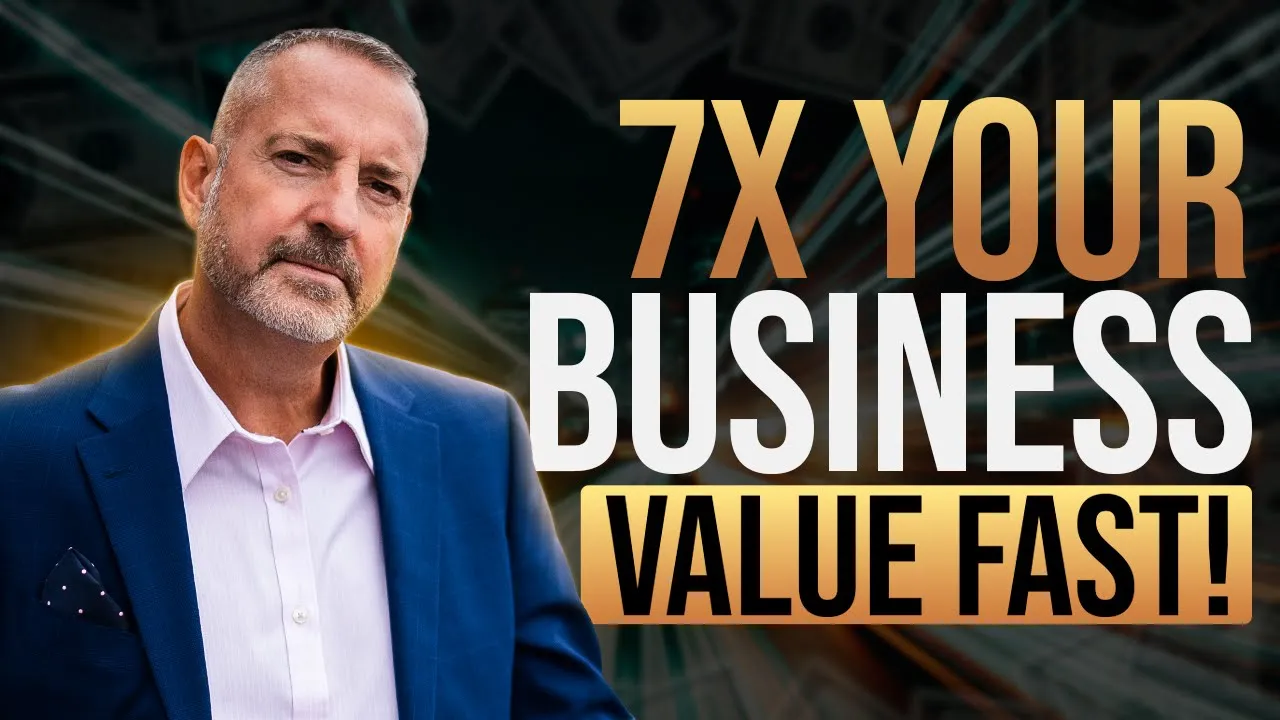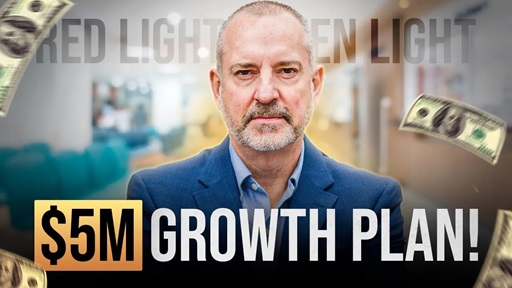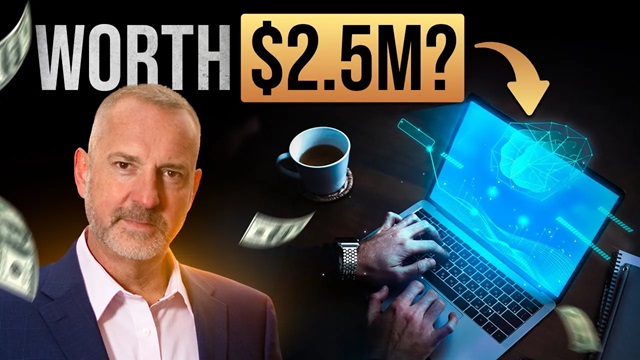The One Time I Bought a Distressed Business – A Deal Story
The One Time I Bought a Distressed Business – A Deal Story
Carl Allen shares a unique story of buying a distressed business, something he typically avoids. He begins by explaining the difference between a distressed business and a distressed seller; the former has severe operational and financial issues, while the latter is owned by someone eager to sell due to personal reasons. Driven by a bet, Carl takes on the challenge of acquiring a distressed web design business in England for £1, only to realize the overwhelming problems it brings, including staff, customer obligations, and significant financial losses.
Once he meets the seller at the airport and officially takes ownership, Carl quickly recognizes the chaotic state of the business. The lack of structure, high costs, and poor cash flow make him question whether it’s worth the time and effort to turn it around, despite his ability to potentially make it profitable over time. Ultimately, he decides he doesn’t want to invest months in fixing the company.
Rather than abandoning the business entirely, Carl comes up with a solution: he hands ownership over to the company’s key employees. By offering them a stake, he transforms their roles from mere employees to partners, hoping that this shift will motivate them to turn the business around. This decision aligns with his belief that employees with equity have a more vested interest in a business’s success.
Carl reflects on the experience as a valuable learning moment, especially since he’s since encountered hundreds of similar distressed deals. He’s concluded that these deals are best avoided unless one is ready to face the significant challenges they entail. This experience has shaped his perspective on evaluating potential acquisitions and helping his Dealmaker Protégé students avoid similar mistakes.
Full Transcript:
Hey, guys. Carl Allen. Got a really interesting kind of deal story for you today that I wanna share with you on the YouTube channel. And it’s about the one and only time in my career that I’ve ever bought a distressed business.
Right? So let me clarify the difference between a distressed business and a distressed seller. Right? A distressed business is a business that basically isn’t making any money.
It’s not generating any cash flow. It’s got issues. It’s got challenges.
Could be people challenges. Could be customer challenges. Could be supplier challenges.
It’s running out of cash. The tax authorities are breathing around your neck. Vendors are chasing you around the block looking for money. Amex have got a hitman out there looking for you.
It’s a really bad business. Now you can always buy those businesses for a dollar. You can even get paid to actually take the business away from the seller. That’s very different to to a distressed seller.
A distressed seller has a business that’s profitable, generating cash flow. You’ve got none of those issues that I just talked about, but the issue all sits inside of the seller’s head. It’s a seller’s mindset. And the seller is frustrated.
They’re distressed. They wanna retire. They could be sick. They could be dying in some cases, and not just them.
It could be, a family member that’s, that’s causing them some issues. So their personal life becomes more important to them, to their their business life. So they’re highly, highly motivated to get out of their business. And we call that in Dealmaker Wealth Society, the MUD score.
It’s all about m for motivation, u for your urgency, and d for distress. And we can actually measure the MUD score. We can actually measure seller psychology when we’re vetting deals, and that gives us a steer on what the valuation and the deal structure needs to look like. Okay?
But distressed deals are deals with no cash flow that they’re a nightmare. It’s it’s an absolute brain damage deal waiting to happen. Now some people do those deals, and I don’t understand why. Because you’re inheriting a job, you’re inheriting somebody else’s problems, and unless you’ve got extreme business turnaround chops, you know, it’s not a deal that you should get into.
Anyway, I once did one, and it was the most horrible day of my life. Right? So let me tell you how I did it. So I went to an event in Spain.
I went to a business buying event with one of my very, very good friends. And literally, the whole scheme of that, the whole theme of that event was was buying distressed businesses. So I, I was actually bet, some money by one of the people there that I couldn’t do a distressed deal. Because I’m all about leverage buyouts, buying great cash flow in businesses, you know, raising capital to do those deals.
That’s what I do. I’m the best in the world at it, but I’m not a distressed business guy. Right? So I thought, well, you know what?
I’m gonna do it. So I agreed to do it, but go buy a business for a dollar, and the guy gave me, like, a week to do it. So I’m literally I’m at the airport in Spain.
It was on the island of Mallorca. So I’m at the airport. It’s about nine PM on the Sunday night. I’ve been there all weekend, and I’m waiting to board my plane back to England.
So I’m having a beer. I’m having a beautiful, crisp, cold San Miguel at the airport bar, and my phone rings. Right? And it’s my it’s my CPA or my accountant in the UK.
So most of the businesses I own are in America. I have one in Australia and a few in the UK.
So my UK accountant, David, calls me because I had to go in, early the following week to sign a bunch of tax returns for for my businesses. So he calls me. And, obviously, as you know, if you call somebody and they’re in a different country, you get that weird kind of international dial tone, when when the phone rings. So I answered the phone, and it was David. He’s like, hey. It’s an hour earlier because he’s in England, I’m in Spain. He said, hey.
You know, when it’s coming next week, I need to sign all these documents, need your wet signatures.
By the way, where are you? Like, I’ve got this international downturn. Are you, like, on holiday? I’m like, no.
No. No. I’ve been to this this business event, and, so I told him about the event and that I accepted this challenge to go and buy a distressed business. Right?
He’s like, really?
Okay. I’ve got a deal for you. As you know, one of my big deal generation strategies is working with deal intermediaries. So CPAs, accountants, lawyers, wealth managers, banks, investors, insurance companies, HR businesses, all that stuff, they can all send you deal flow.
So I literally just told him what I was doing. He’s like, dude, I got a deal for you. Right? It’s a web design company.
It’s about an hour away from your house in England.
Why don’t you have a conversation with the seller? I’m like, yeah. Okay. Whatever. No problem.
I I was kinda putting it off because I didn’t wanna do it because I knew it wasn’t gonna work, but I accepted the challenge I was gonna do it. So literally, puts the phone down to David. I’m I’m literally halfway through, my pint of San Miguel. My flight’s boarding in about an hour, and my phone rings.
Unknown number. Now, normally, I don’t take calls, with an unknown number. I just I just read, but they leave a voicemail. If I know them or I wanna talk to them, I’ll ring them back.
But, but I I don’t know what compelled me. So my phone’s my phone’s ringing, and I answered it. Right? And I never do that, but I did.
I answered it. I thought it was one of my children because I bought one of my children a new cell phone. So I didn’t know the number, so it was that, but it wasn’t. So there’s this guy.
He’s like, hello. This is Carl Allen. Yes.
He’s like, hi. It’s Brian from this company. Right? This name of this web design company.
And, I’m like, yeah. Okay. Hi. How are you doing? He said, yeah. Yeah. Yeah. I said, you know, David just text me, told me to call you.
Why? Are you gonna buy my business? I’m like, woah. Hang on a minute. Why? I found out about this three minutes ago.
I’m happy to have a conversation about it. You know, are you free Thursday? So I was down in around Manchester.
I could have gone and seen him. He’s like, no. If we’re doing it, we’re doing it tonight. So we can’t do it tonight.
I’m in Spain. I’m about to get on a plane. I don’t go back to the UK till about ten thirty at night, and I go drive home. So I’ll meet you at the airport.
What time do you land? What’s your flight number?
I’m like, okay. So I gave him the details.
So my listen, my head’s spinning. I’m like, what the hell? What am I doing? So I guess on the plane, flies back to UK.
It’s like a two hour flight. I get off the plane. I’ve only got hand luggage, because I’ve only been there for a few days. Walks through the arrival of Man strip or terminal one, and the guy’s there, and he’s got a sign with my name on it.
Right? He’s got a sign with my name on it, like Carl Allen. Like, you know, like, when a when a driver picks you up from the airport to take you somewhere, he didn’t he wasn’t wearing a hat or anything like that, but, you know, he was there, like, excited to see me like his savior, his knight in shining armor, had ridden in to save him. Right?
So literally, we we we went and sat down at, the coffee shop, in arrivals at Manchester Airport terminal one, and, I agreed to do the deal. A pound pound for the business, and he said, hey, can you come down tomorrow to the business, and we’ll we’ll consummate the deal. So no problem. So I literally wrapped up.
He had a legal one page legal document waiting for me to sign. I read it. I took a photograph of it. I texted it to my attorney.
He had a look at it, and he calls me. He’s like, what are you doing? Like, why are you buying a business that’s got no money? All these problems.
I said, you know, bear with me. I’m doing it for a bet. Right? Somebody bet me I couldn’t do one of these deals, so I’m gonna do it.
So literally, so I signed the document.
I had a thirty minute handover with the seller, then he’s off. Right? So now I am business, the lease on the building. I’ve got nineteen customers.
I’ve got fourteen staff, and a whole bunch of brain damage. Right? All this stuff’s going wrong. So literally, I’m in the business for three hours.
Right? Three hours I’m in the business, and I’m talking to the lead developer. I’m talking to the financial controller. I’m talking to the salesperson.
Right? And literally, it’s all these other people. And it’s chaos. Right? There’s no structure. There’s no leadership.
You know, it was just an absolute nightmare. And three hours in, there’s so many issues with this business. I’m like, what the heck am I gonna do? Like, do I wanna spend, like, six months working in this thing to kinda turn it around?
It it was losing about fifty thousand pounds a month. Right? And and I could have fixed it. If I really wanted to, I could have fixed it.
Would have took me six months, and I could have done deals with all the all the payables. I could have done deals with the tax people.
I could have implemented my sales and marketing system, And I’d have done that. Right? Six months, I might have made half a million pounds. Right?
I could have done it, then flipped it, sold it to the bottom business, made half a million pounds. But I’m sat there thinking, do I wanna waste six months of my life to make half a million pounds? Right? I could spend six hours of my life doing a profitable deal and make the same amount of money.
So I’m sat there, and I’m like, I don’t wanna do this. So I calls the seller. Right? I calls the seller, and literally, he’s at the airport waiting to go on vacation with his family.
Like, I saved his life. I’m like, buddy, Brian. Yeah. I don’t wanna do this deal.
He’s like, sorry. We’ve done it now. I ain’t coming back.
It’s your problem. So I sit down. I’m thinking, what am I gonna do now? Right?
You know, I’ve just inherited a business. I got employees. They’re gonna depend on me. I got customers that are gonna depend on me.
I thought, I know what I’ll do.
I’ll give it to the employees. Right? So I literally I got the sales, lead. I got the, the financial controller, and I got the lead web developer. I got them into the office, and I went, guys, congratulations.
I’ve come in. I’ve looked at this business. I think you’d be better owners. I think you’d be the perfect owners for this business.
And they all went, really? I said, yeah. I said, absolutely. Yeah. I’m gonna give you each a third of the company, or I’ll give each of you twenty five percent.
And then the final twenty five percent, if you want, just give it to the employees. Right? You know, give them a couple of points each or however you wanna do it. But, but sign this piece of paper, and you’ll be owners of this company, and then you can divvy up the shares however you want.
And they’re like, woah. That’s amazing. Thank you so much. Why the seller didn’t agree to do this?
I don’t know. Anyway, so I did that deal. Ten minutes later, I’m out. Never went back.
I think the business is still around. I think they managed to kinda turn it around. We we made the employees part of the solution.
So I think when when you have key employees in a business and they’re not partners, they don’t have any upside, either a profit interest partnership or a profit share or real equity, then then they’re just employees. And when you make them a partner, when you put them part of the solution to scale and optimize and make the business more valuable, their mindset changes. They go from employee to employer. They become a partner in the actual deal.
So that’s what I did. And I’m driving back, and then David calls me, my accountant. He’s like, hey. How did it go?
I went, yeah. I did the deal, but now I’ve just given it back. I’ve given it back to the employees. Didn’t make any money out of it, but it was a very, very valuable learning experience.
And since then, I’ve probably looked at two hundred and fifty deals that were very, very similar. You you look at deals on broker sites and they look very profitable. And then when you get the actual numbers and you go through them, you find out that they’re actually distressed businesses. They’re losing money, and I literally dropped them like third period French.
So I will never do a distressed deal again ever. It was a big learning lesson for me, but I did it for a bit, and I wanted to share that story with you. So I’ll be back with some more deal stories. I got hundreds and hundreds of really good stories about deals that I’ve done.
But more importantly, the massive lessons that I’ve learned and how I can translate those lessons into my Dealmaker Protege students so they don’t make the same mistakes that I’ve made in my thirty two year dealmaker career. So I hope you found that useful, and I will see you soon for another video. Until then, bye for now. And don’t forget to hit like and subscribe to get real time access to all of my amazing content that I’m putting out on this platform.
I will see you guys soon. Bye for now.



